To nobody’s surprise, trade talks with Mexico and Canada have stalled. Reminder that these are America’s top two trading partners and export markets, so securing a favorable deal isn’t just a nice-to-have, it’s a necessity.
With US manufacturing on the line (and severe economic damage), I suspect a deal isn’t far off. North American production is growing in importance as China declines. Mexico offers a nice growth opportunity and some potential for political wins as the fentanyl trade is disrupted. To the north, deal progress has been slowed by some unrelated speed bumps.
If there was ever a trade relationship that needed to get hammered out ASAP, it’s NAFTA. Since Trump has already stamped his name on NAFTA 2 during his first term, I’m hopeful we’ll see some progress here soon.
Transcript
Hey all, Peter Zeihan here coming to you from Colorado. We’re going to continue with our open ended series on the nature of the trade relationship that the United States is building with the rest of the world under Donald Trump. And today we’re going to talk about trade deals that have not yet happened. And that’s Canada and Mexico. According to the Trump administration, both of these countries are going to require significant additional time to negotiate at least 90 days with Mexico and a kind of an indefinite hold on everything with Canada.
These two matter more, I would argue, than all of the other deals put together. Mexico is our top trading partner. Canada is number two. Both of them, a few years ago surpassed China and are not looking back. Both are also our number one and our number two export markets.
So unlike China or Europe where the trade imbalance is pretty significant here, while there is a trade imbalance, it’s not nearly as large because we send them lots of stuff. Basically these are integrated economic spaces. And if we sever our relations with either Mexico, Canada, it would be like severing our relationship with California or Texas. What that means in real terms is roughly 14 million jobs in the United States are directly, dependent upon trade with our immediate neighbors.
That’s about 10% of the total labor force. So if we can’t get a deal that favors Canada, Mexico versus the rest of the world, we’re going to not just see a significant drop off in local economic exchange. We’re going to see a significant hit to U.S. employment in manufacturing in general, unlike products that come from Europe or East Asia, which are largely completed when they hit U.S stores, products that come from Canada and Mexico are part of an integrated manufacturing system, with different pieces of the end product being made in different parts.
Of the three country union that is NAFTA. And if you cut that out, then the American manufacturing model fails from the inside. And all that’s left is to import things from further abroad. Now the smart money remains on a meaningful deal for a couple of reasons. Number one, the economic catastrophe that would hit the United States if there wasn’t a deal would be horrendous.
And Trump will definitely go down in history as the worst negotiator we’ve ever had on trade. Number two, the Chinese are dying. And if we can’t build out manufacturing in North America, then we just won’t have product. So we really are on the clock here. And every day that passes that we don’t have clarity in the Mexican, Canadian and American tri relationship is a day that we fall a little bit further behind and basically set up China to succeed in the short run.
But us to fail in the long run. The third issue, of course, is employment. We will build this very, very quickly. And the fourth is growth markets. Canada has a very similar economic and demographic to us where we’re steadily aging. And so consumption is probably approaching peak levels. Mexico is not in that category. It already has $1 trillion consumption market, and it has a population bulge for people aged roughly 5 to 35, which is exactly where you want it.
If you want people buy in more and more and more and more. So of all of the consumption led economies in the world outside of the United States, Mexico is the one that has the strongest growth trajectory, not just for employment and stability, but for product consumption, which is something that in a world that is rapidly aging, is something you want to get Ahold of.
Another big reason to think that this is probably going to go somewhere is when Trump made his 90 day delay on the Mexico announcement, he specifically mentioned that there’s a fentanyl tariff in place. Well, fentanyl imports into the United States have been dropping for the last couple of years. Thank God for a mix of reasons. It has very little to do with policy.
But Trump has inadvertently adopted a tariff policy that’s actually going to speed that process along and give Trump the opportunity to call a win. And that has to do with something called the de minimis exception. So when you purchase something on line that is less than $800 and is sourced from another country, it comes into the country without basically customs declaration or taxes.
That is now over under the Trump administration. We now have a really steep tax. So everything that used to get from China say, is basically over. And that is how most of the precursor materials that are used in fentanyl made it to North America. They’re shipped via de minimis to the United States, and they’re repackaged and trucks to Mexico be to be turned into fentanyl.
Anything that interrupts that process, anything that puts friction in that process, is going to raise the relative cost of fentanyl. It’s still wildly profitable, but, you know, every little bit helps. There is one complication in all of this, and that is ironically, Gaza. Oh my God. So there are a number of countries that include France and Britain and Australia and Canada that are talking about imminent recognition of the Palestinian state.
As a formal country. Now, there’s a number of reasons why I think this is silly. We have a video we did on that relatively recently in case you want to review. But Trump has singled out one of those countries as this being a problem for trade relations. And that’s Canada. So there’s supposedly a deal with the European Union.
There’s supposedly a deal with the United Kingdom, a supposedly one with Australia is coming in. Trump doesn’t seem to care about any of those, but Trump really has a bee in his bonnet when it comes to Canada about pretty much everything. And so he’s chosen to make the Palestinian recognition issue a subject that falls now under trade talks.
And that has basically put relations with Canada on hold again. It’s very arbitrary, which means it could be going away arbitrarily tomorrow. But for the moment, it’s another issue that Trump has picked up on that has stalled relations that in the past is something that U.S administrations wouldn’t even blink out because they really don’t matter anyway.
That’s the bottom line here. The two relationships that we need most for now, for the future, for American growth, for North American stability to beat down the drug war, to ensure high levels of American employment, to prepare for a post China world, they are still in limbo. One other reason to think that it might work out NAFTA two was negotiated by the first Trump administration.
So it really wouldn’t take much for Trump to say I’m putting my name on something because he already has.












